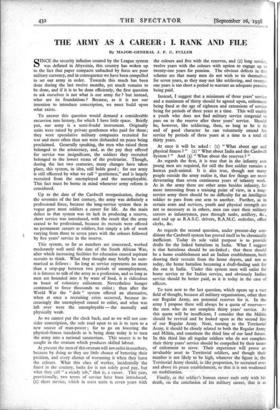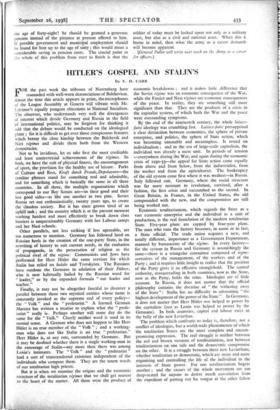THE ARMY AS A CAREER: I. RANK AND FILE
By MAJOR-GENERAL J. F. C. FULLER
SINCE the security inflation created by the League system was deflated in Abyssinia, this country has woken up to the fact that paper compacts unbacked by force are poor military currency, and in consequence we have been compelled to set our army in order. Towards this much has been done during the last twelve months, yet much remains to be done, and if it is to be done efficiently, the first question to ask ourselves is not what is our army for ? but instead, what are its foundations ? Because, as it is not our intention to introduce conscription, we must build upon what exists.
To answer this question would demand a considerable excursion into history, for which I have little space. Briefly put, our army is a semi-feudal instrument. Originally units were raised by private gentlemen who paid for them; they were speculative military companies recruited for war and more often than not were disbanded on peace being proclaimed. Generally speaking, the men who raised them belonged to the aristocracy, and, as the pay they offered for service was insignificant, the soldiers they recruited belonged to the lowest strata of the proletariat. Though, during the last two centuries, many changes have taken place, this system, in idea, still holds good ; for our army is still officered by what we call "gentlemen," and is largely recruited from the unemployed and the unemployable. This fact must be borne in mind whenever army reform is considered.
Up to the date of the Cardwell reorganisation, during the seventies of the last century, the army was definitely a professional force, because the long-service system then in vogue gave most soldiers a career for life. As the main defect in that system was its lack in producing a reserve, short service was introduced, with the result that the army ceased to be professional, because its recruits were offered no permanent careers as soldiers, but simply a job of work varying from three to seven years with the colours followed by five years' service in the reserve.
This system, so far as numbers are concerned, worked moderately well until the date of the South African War, after which increasing facilities for education caused aspirant recruits to think. What they thought may briefly be sum- marised as follows : So long as service represents no more than a stop-gap between two periods of unemployment, it is fatuous to talk of the army as a profession, and so long as men are hounded into it by want of food, it is ridiculous to boast of voluntary enlistment. Nevertheless hunger continued to force thousands to enlist ; then after the World War the " dole " system offered an alternative, when at once a recruiting crisis occurred, because in- creasingly the unemployed ceased to enlist, and what was left over were the unemployable — the mentally and physically weak.
As we cannot put the clock back, and as we will not con- sider conscription, the sole road open to us is to turn to a new source of man-power ; for to go on lowering the physical-fitness standards as is being done today is to turn the army into a national sanatorium. This source is to be sought in the stratum which produces skilled labour.
At present the men of this stratum will not enlist in numbers, because by doing so they see little chance of bettering their position, and every chance of worsening it when they leave the colours. What this class of worker, incidentally the finest in the country, looks for is not solely good pay, but what they call " a steady job," that is, a career. This year, provisionally, two terms of service have been introduced, (r) short service, which in most units is, seven years with the colours and five with the reserves, and (2) long service, twelve years with the colours with option to engage up to twenty-one years for pension. The obvious defects in this scheme are that many men do not wish to tie themselves for seven years, as they may not like soldiering, and twenty- one years is too short a period to warrant an adequate pension being paid.
Instead, I suggest that a minimum of three years' service and a maximum of thirty should be agreed upon, enlistment being fixed at the age of eighteen and extensions of service being for periods of three years at a time. This will enable a youth who does not find military service congenial to pass on to the reserve after three years' service. Should he, however, like soldiering, then, so long as he is fit and of good character he can voluntarily extend his service by periods of three years at a time to a total of thirty years.
At once it will be asked : (t) "What about age and physical fitness ? " (2) "What about India and the Cardwell System ? " And (3) "What about the reserves ? "
As regards the first, it is true that in the infantry arm young men are required, for still the foot soldier remains a human pack-animal. It is also true, though not many people outside the army realise it, that few things are more devastating than seven continuous years of infantry work. As in the army there are other arms besides infantry, far more interesting from. a training point of view, in a long- service army there should be no difficulty for an intelligent soldier to pass from one arm to another. Further, as in certain arms and services, youth and physical strength are not so necessary as in others, men can start their military careers as infantrymen, pass through tanks, artillery, &c., and end up as R.A.S.C. drivers, R.A.M.C. orderlies, office clerks, &c.
As regards the second question, under present-day con- ditions the Cardwell system has proved itself to be chronically inefficient. Today its sole valid purpose is to provide drafts for the linked battalions in India. What I suggest is that battalions should be un-linked ; that there should be a home establishment and an Indian establishment, both drawing their recruits from the home depots, and not as today, the home battalion becoming a draft-finding unit for the one in India. Under this system men will enlist for home service or for Indian service, and obviously Indian service should be better paid, as it is today in the case of officers.
To turn now to the last question, which opens up a vast field of thought, because all military organisations, other than our Regular Army, are potential reserves for it. In the army I propose there will always be a quota of reserves— the men who do not complete thirty years' service. As this quota will be insufficient, I consider that the Militia should be revived and be looked upon as the second line of our Regular Army. Next, turning to the Territorial Army, it should be closely related to both the Regular Army and Militia, and constitute the third line of our land forces. In this third line all regular soldiers who do not complete their thirty years' service should be compelled by their terms of enlistment to serve. Their experience will prove an invaluable asset to Territorial soldiers, and though their number is not likely to be high, whatever the figure is, the Territorial Army should, in like proportion, be recruited over and above its peace establishment, so that it. is not weakened on mobilisation.
Finally, as the soldier's human career ends only with his death, on the conclusion of his military career, that is at the age of forty-eight! he should be granted a generous pension instead of the pittance at present offered to him. If possible government and municipal employmtnt should be found for him up to the age of sixty ; this would mean a Lonsiderable saving in pension costs. The crucial point in :he whole of this problem from start to finish is that the soldier of today must be looked upon not only as a military asset, but also as a civil and national asset. When this is borne in mind, then what the army as a career demands will become apparent.
[General Fuller will write next week on the Army as a career for officers.]











































 Previous page
Previous page